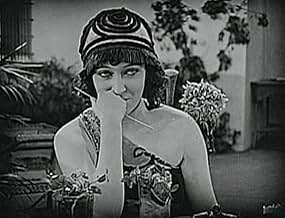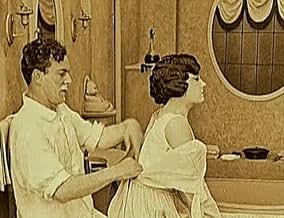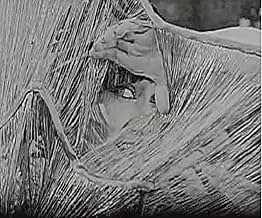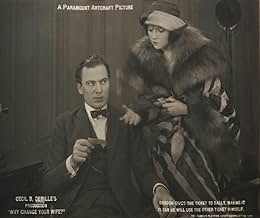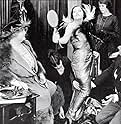Robert and Beth Gordon are married but share little. He runs into Sally at a cabaret and the Gordons are soon divorced. Just as he gets bored with Sally's superficiality, Beth strives to imp... Read allRobert and Beth Gordon are married but share little. He runs into Sally at a cabaret and the Gordons are soon divorced. Just as he gets bored with Sally's superficiality, Beth strives to improve her looks. The original couple falls in love again at a summer resort.Robert and Beth Gordon are married but share little. He runs into Sally at a cabaret and the Gordons are soon divorced. Just as he gets bored with Sally's superficiality, Beth strives to improve her looks. The original couple falls in love again at a summer resort.
- Director
- Writers
- Stars
- Doctor
- (as Clarence Geldart)
- Naval Officer at Hotel
- (uncredited)
- Party Guest Dozing
- (uncredited)
- Girl in Bathing Suit
- (uncredited)
- Sally's Maid
- (uncredited)
- Director
- Writers
- All cast & crew
- Production, box office & more at IMDbPro
Featured reviews
Thomas Meighan is not so well remembered today except for hard core silent buffs. Few of his films are rarely revived and he died in 1936 after a two year bout with cancer. Another major silent star who did have some successes in sound was Bebe Daniels, probably most famous for singing "You're Getting To Be A Habit With Me" and breaking her leg in 42ND STREET.
Meighan and Swanson co-starred together in DeMille's MAN AND FEMALE a year previous to this one. Here, they are introduced as husband and wife in a script written by William DeMille, Cecil's brother. While Thomas shaves, Gloria pesters him into buttoning the back of her dress. It's a humorous modern day problem and both leads are funny as they frustrate each other.
She won't even let him listen to HINDISTAN - A FOX TROT on a vintage 78 and forces him to listen to A DYING POET instead. By the way, Hindistan is another name for India. There is throughout a condescending tone to non-whites. but it's not as bad as some other films. In fact, DeMille would be guilty of that throughout his career but I do bear in mind he wasn't alone and many were worse. More fun to watch, though, is what passed for high fashion in 1920. I don't think anyone would be caught dead today wearing what passed for bathing suits back then.
It is at the store where Meighan meets Daniels who gets to play a total vamp, even comically putting a heart size mole on her arm. She literally seduces him on the spot. While they go out, poor Gloria has her violin recital playing A DYING POET without her husband. Later on, straight laced Gloria Swanson reads about their marriage following her divorce. Well, two can play this game. Gloria goes to the store herself and gets herself some outrageous clothes and has several admirers follow her to a rich resort that has a great swimming pool where guests can sit. Somehow, Meighan and Swanson get back together while Daniels gets the violin player.
I really doubt people really lived like this in 1920, but romantic escapist films are made today. A fun little picture.
The second half of this double-bill features one of the very few surviving films of Cecil's older brother William de Mille (he kept the original family spelling) who started his career as a successful Broadway playwright. One of his plays THE WARRENS OF VIRGINIA from 1907 featured Cecil as an actor and a 15 year old performer named Mary Pickford. MISS LULU BETT was based on the stage version of a then famous book which examined the lonely life of a maiden aunt and her attempts to break free from the stifling enviornment of her sister's family. This is a silent example of what was then called a "woman's picture" which we know today as a "chick flick". It concentrates on plot and slow development of character rather than fast pacing and lots of action. In style it is very similar to the films of Lois Weber especially THE BLOT (also reviewed by me) which came out the same year, 1921, just one year after women received the right to vote. The ensemble performances by the family are all solid with Lois Wilson a standout as the title character. Wilson was a big star for Paramount in the early 1920's later appearing in 1923's THE COVERED WAGON. Although LULU is dated by today's standards, it's fascinating to see just how dated and just how far single women have come since 1921. While I enjoyed WIFE, I have to give the nod here to brother William as I got more out of his film than I expected. Hopefully more of them will become available for us to see...For more reviews visit The Capsule Critic.
This is a great romp, getting better with every scene. It is not good to women, though, making them out to be selfish and catty. It also makes it seem that a woman's role is to be beautiful for her man, and if she isn't, he practically has the right to leave her. I mean, come on now!
The leads (three of them) are all first rate. The man is a charmer, really convincing and natural, Thomas Meighan. His wife (at first) is Gloria Swanson, a silent screen staple (especially for director Cecil B. de Mille who directed six straight films with Swanson, including the parallel, Don't Change Your Husband (1919). But the third other woman is Swanson's match, Bebe Daniels, and if she isn't as famous, it's only because time is fickle.
Because the three are so well balanced, both in ability and in the way they are given time together (in all three possible combinations, plus all three of them together), the film really builds momentum well. The modernity of flipping wives was probably part of the racy appeal, and it might seem a little staid by our standards, where there is (sometimes) less gravity to a marriage.
Music is key, which might seem odd for a silent film, but by showing us the 78 records being put on, the audience knows what the soundtrack would be. (The actually sound tacked on to my DVD version of this film is a brutal melange of found orchestral pieces that cut in and out, hither and tither.) For those interested in the actual piece called Hindustan that is key in three scenes (and key to the changing sentiments of the women) go to www.archive.org/details/JosephC.SmithsOrchestra-01-07 and you can actually click on piece to hear it (a lively pre-jazz dance type number).
So is this a pertinent film? In a way, it is. It's basic theme of paying attention to what your mate needs, and appreciating their attentions, is pretty timeless. But in other ways the film is sadly, painfully retrograde, and it isn't just because it's 1920. The way the women vie for the man, and the way he lets them, and ultimately the way he treats the Daniels character (who does him no wrong any more than the Swanson one does), is just cheap and tossed around for comedic purposes. Which is how you can take it and enjoy it. More than you'd expect.
The movie isn't entirely cynical about romanceit is never really in doubt that Beth and her husband love each otherbut it is shrewd enough to recognize that in holding the attention of your partner a little glamour and sophistication doesn't hurt (the husband isn't let off the hook though, and his naiveté in expecting the honeymoon phase to last forever is mocked in a bathroom scene when Sally repeatedly interrupts his attempts to shave just as Beth did earlier).
A side note: All the leading players are engaging, but the violinist (played by Theodore Kosloff) who seduces women by making love to their souls steals every scene he is in.
To sum up, this worldly comedy challenges the common assumption that silent film is little more than slapstick or melodrama.
Did you know
- TriviaFor a silent movie, music plays an important part in it, with a private music recital and a public orchestra performance giving the mood for two scenes. Most significantly, music records with three different types of music are prominently displayed in the hands of two main actors, and are intrinsic to the story development.
- Quotes
Beth Gordon: Do you expect *me* to share your Oriental ideas? Do you want your *wife* to lure you like a - a - Oh why didn't you marry a Turk?
- ConnectionsFeatured in Hollywood (1980)
- SoundtracksHindustan - Fox Trot
By Oliver G. Wallace and Harold Weeks
Interpreted by Joseph C. Smith's Orchestra
Published by Victor 18507-A
Details
- Release date
- Country of origin
- Languages
- Also known as
- Zašto menjati ženu
- Production company
- See more company credits at IMDbPro
- Runtime
- 1h 30m(90 min)
- Color
- Sound mix
- Aspect ratio
- 1.33 : 1



